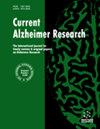阿尔茨海默病相关精神病:临床表现、发病机制和当前治疗综述。
IF 1.9
4区 医学
Q3 CLINICAL NEUROLOGY
引用次数: 1
摘要
行为和精神表现,包括攻击性、妄想和幻觉,是阿尔茨海默病(AD)、肌萎缩性侧索硬化症、多发性硬化症和帕金森病等衰弱性神经疾病患者常见的合并症。ad相关精神病可能与疾病预后不良有关,强调早期发现和治疗是必须的。表现是可变的,可能是非常异质的,强加了一个真正的诊断问题。一些评估工具,如behavior - ad, CERAD-BRSD和心理-感觉幻觉量表已经被设计用来促进诊断。神经退行性相关精神病背后的机制是复杂的,并没有完全理解,给研究人员施加了负担,以找到适当的管理模式。家族病史和一些遗传障碍可能在阿尔茨海默病患者的这些妄想和幻觉中起决定性作用。神经元细胞的丧失、中枢神经某些区域的萎缩和突触功能障碍也可能导致这些合并症。此外,由白细胞介素和肿瘤坏死因子等促炎因子引发的炎症紊乱是阿尔茨海默病患者许多精神病性症状发生的潜在危险因素之一。人们对可能的管理工具知之甚少;因此,迫切需要进行精心设计的试验,以研究可以改善这些患者护理过程的药物和非药物干预措施。本文综述了目前有关ad相关精神病的症状、病理特征、评估和治疗的研究结果。本文章由计算机程序翻译,如有差异,请以英文原文为准。
Alzheimer's Disease-Related Psychosis: An Overview of Clinical Manifestations, Pathogenesis, and Current Treatment.
Behavioral and psychotic manifestations, including aggression, delusions, and hallucinations, are frequent comorbidities in patients with debilitating nervous illnesses such as Alzheimer's disease (AD), Amyotrophic Lateral Sclerosis, Multiple Sclerosis, and Parkinson's disease. AD-related psychosis may be linked to a poor disease prognosis, highlighting that early detection and management are mandatory. The manifestations are variable and may be very heterogeneous, imposing a real diagnostic issue. Some assessment tools such as BEHAVE-AD, CERAD-BRSD, and the Psycho-Sensory Hallucinations Scale have been designed to facilitate the diagnosis. The mechanisms behind neurodegeneration-related psychosis are complex and are not fully understood, imposing a burden on researchers to find appropriate management modalities. Familial history and some genetic disturbances may have a determinant role in these delusions and hallucinations in cases with AD. The loss of neuronal cells, atrophy in some regions of the central nervous, and synaptic dysfunction may also contribute to these comorbidities. Furthermore, inflammatory disturbances triggered by pro-inflammatory agents such as interleukins and tumor necrosis factors are stratified among the potential risk factors of the onset of numerous psychotic symptoms in Alzheimer's patients. Little is known about the possible management tools; therefore, it is urgent to conduct well-designed trials to investigate pharmacological and non-pharmacological interventions that can improve the care process of these patients. This review summarizes the current findings regarding the AD-related psychosis symptoms, pathological features, assessment, and management.
求助全文
通过发布文献求助,成功后即可免费获取论文全文。
去求助
来源期刊

Current Alzheimer research
医学-神经科学
CiteScore
4.00
自引率
4.80%
发文量
64
审稿时长
4-8 weeks
期刊介绍:
Current Alzheimer Research publishes peer-reviewed frontier review, research, drug clinical trial studies and letter articles on all areas of Alzheimer’s disease. This multidisciplinary journal will help in understanding the neurobiology, genetics, pathogenesis, and treatment strategies of Alzheimer’s disease. The journal publishes objective reviews written by experts and leaders actively engaged in research using cellular, molecular, and animal models. The journal also covers original articles on recent research in fast emerging areas of molecular diagnostics, brain imaging, drug development and discovery, and clinical aspects of Alzheimer’s disease. Manuscripts are encouraged that relate to the synergistic mechanism of Alzheimer''s disease with other dementia and neurodegenerative disorders. Book reviews, meeting reports and letters-to-the-editor are also published. The journal is essential reading for researchers, educators and physicians with interest in age-related dementia and Alzheimer’s disease. Current Alzheimer Research provides a comprehensive ''bird''s-eye view'' of the current state of Alzheimer''s research for neuroscientists, clinicians, health science planners, granting, caregivers and families of this devastating disease.
 求助内容:
求助内容: 应助结果提醒方式:
应助结果提醒方式:


